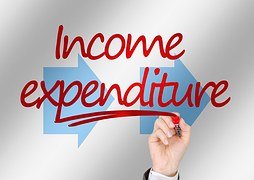US Tax Considerations- Blogging on Steemit: For Profit Business Activities

In the prior articles I have written on US Tax considerations, we learned how to value the US Dollar income received from STEEM and Steem Based Dollars and we learned how to calculate the capital gain (or loss) from exchanging STEEM and Steem Based Dollars for US Dollars. We have also discussed reporting requirements if you hold your STEEM and Steem Based Dollars in foreign crypto exchanges, discussed in a very general overview how the IRS determines if you are engaged in a for profit business or just a hobby and in the most recent blog, we have discussed loss limitations on not for profit activity- hobbies.
We discovered in the last article, having our blogging business reclassified as a hobby opens us up to some loss limitation rules which could have a very serious negative impact. Suppose we decided to follow the advice given in pervious articles about staying within a general framework of the Nine Factors the IRS Uses to Determine if it’s a Business or Hobby (https://steemit.com/tax/@lpfaust/us-tax-considerations-blogging-on-steemit-business-or-hobby-how-the-irs-determines-it). What are the differences and benefits of having our blogging business activity viewed as for profit instead?
Let’s take a closer look in a very general way…
But First, The Required Legalese…
Any accounting, business or tax advice contained in this communication, including attachments and enclosures, is not intended as a thorough, in-depth analysis of specific issues, nor a substitute for a formal opinion, nor is it sufficient to avoid tax-related penalties.
For Profit Business Activities Revisited (Differences)

As we discussed in previous blogs, the real difference centers, not around income, but around permitted “ordinary and necessary” business deductions.
Two key (and related) differences of for profit business activities as opposed to not for profit activities (hobbies) are: (i) the ability to generate business losses when permitted expenses exceed gross income, and (ii) net operating loss carrybacks and carryforwards.
Again, this some dense subject matter, so we will be taking a very general overview.
For purposes of this discussion, we are limiting the scope of this to Sole Proprietorships and Single Member LLCs who have chosen to be taxed as a Sole Proprietorship. Both of these entities would be required to file a Schedule C.
Business Losses
Unlike not for profit activities (hobbies), permitted expenses taken are not limited to total gross income. Ordinary losses are fully deductible. The distinction of “ordinary loss” refers to losses related to expenses which fall under the “ordinary and necessary” definition (think operating expenses) as opposed to “capital losses” which stem from things such as investment, asset purchases and disposals (think properties, crypto, equipment, etc.)
For example, if we have for profit business activities which generated $10,000 in gross income and had permitted expenses of $15,000, we would record an ordinary loss of $5,000. Not for profit activities (hobbies) could only take $10,000 of expenses because permitted expenses taken for tax purposes cannot exceed gross income.
Net Operating Loss (NOL) Carryback and Carryforward
For purposes of this article, I will not get into the specifics of how an NOL is calculated, but I will discuss how NOL carrybacks and carryforwards work.
In some cases, it is possible the loss generated by the business is so great, that it far exceeds the taxable income of the taxpayer for the filing year, and a Net Operating Loss (NOL) is generated. Generally speaking, when an NOL is generated, it may be carried back over the prior two years to generate an immediate refund from the IRS.
If the total NOL has not been used after applying it to the prior two periods, the remaining NOL is carried forward for use in future years. It is possible to waive the two year carryback if the taxpayer is so inclined.
Wrapping it Up
The benefit of having our business activity viewed as for profit cannot be understated. The fact we are able to both generate a loss and by extension, possibly generate a Net Operating Loss (NOL), which can generate an immediate tax refund from the IRS is a tremendous advantage.
Now that we have covered income, not for profit business activity and for profit business activity, the next installment we will look a bit deeper into the “ordinary and necessary” designation, then begin looking at specific deductions.
Have a tax question? Please feel free leave a question in the comment section below and I may feature it in a future blog post.
Please follow me on my blog @lpfaust if you enjoy my content.
Okay, so I have an LLC that I really haven't been using. How could I list my SteemIt profits and losses under my LLC?
@kryptic, thanks for asking the first question. My response would be that I have to know more before I can advise.
Some of the questions which come to mind are, when was the LLC formed? Is it a Single Member LLC or does it have more than one member? What option was chosen for taxation method (as a sole proprietor, partnership or corporation)? How long ago was this LLC formed or was it acquired through purchase of another company? Have returns been filed for this LLC already in prior years?...and so on.
For example, imagine you have been running income and expenses through this LLC for another business in a completely different category (catering for instance) and you have already filed returns, the answer would be completely different than if this is a virgin LLC that was formed earlier this year with zero returns filed.
Assuming it's a virgin, single member LLC, with its own Employer Identification Number (EIN), designated to be used for blogging or writing when you filed the EIN and with no tax returns filed. The basics you should do are:
It's a summary of the topics covered in my earlier blog https://steemit.com/tax/@lpfaust/us-tax-considerations-blogging-on-steemit-business-or-hobby-how-the-irs-determines-it
If you'd like, feel free to shoot me an email at [email protected] so I can get more of the backstory I need to help point you in the right direction.
Any accounting, business or tax advice contained in this communication, including attachments and enclosures, is not intended as a thorough, in-depth analysis of specific issues, nor a substitute for a formal opinion, nor is it sufficient to avoid tax-related penalties.
I told ya @lpfaust it was only a matter of time before you were rewarded properly. CONGRATS AND
Full $teem Ahead!
@streetstyle
Thanks for the recognition and the support @streetstyle. I'm glad to see that, although it took some time (and persistence on my side) in the end it's paying off. I honestly enjoy writing and I'm hoping to turn this into something more full time than part time.
As I have been writing these articles on Steemit, focusing on tax considerations for those who blog here, it's kind of inspired me to begin thinking about writing tax how to books for the layperson in different trades. My passion is to focus on the writer, entertainer, musician and artist but I think small business in general needs to better understand the rules to play the game with any possibility of winning.
There's more than just that I am considering (and I will spare everyone here) and I don't think I would have considered it before Steemit.
Steemit has either forced me to go back and do stuff I used to do or learn and try different things, that is for sure.
@streetstyle, Steemit is creating possibilities for me I'd not considered before. I would not have though about blogging, developing an audience, writing a book or spend time sifting through content to find things which speak to me and share with the group at large. I am incredibly interested in where this experience is taking me.
quality is mostly always rewarded! great job @lpfaust!
I appreciate the recognition and support @cristi. I have been fan and a follower of yours for a little bit. It does mean alot to me when I have a chance to interact with my audience and as I was saying to @streetstyle, I have been hoping to turn this into something more full time than part time. It's both such an amazing high and deeply humbling to be recognized and rewarded.
It's a serious challenge to take something dense, confusing and boring like tax law and turn it into something simplified, useful and understandable to the non-tax practitioner. I'm enjoying dissecting and figuring out how to present it and I'm hoping it's helping writers and creators here.
Go job @lpfaust I knew it was only a matter of time.
full $teem ahead!
@streetstyle